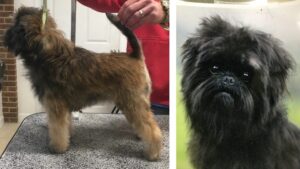
Back to Basics…It’s Time
Discover the essentials of the Affenpinscher breed and the importance of maintaining true breed type against the trend toward exaggeration.
Home » Dog Breeds » Affenpinscher Dog Breed
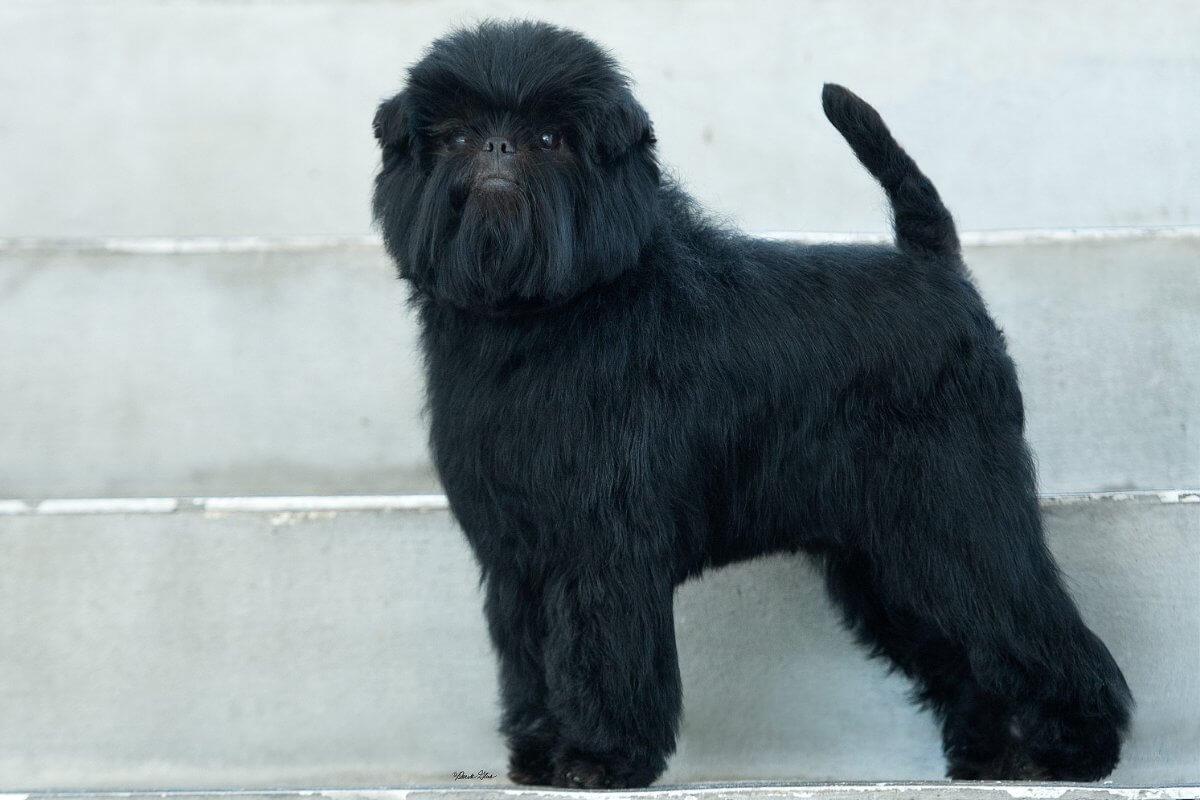
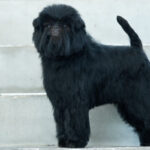
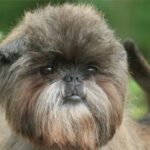
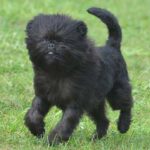
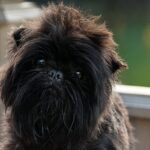
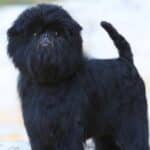
Often referred to as the “Monkey Dog” due to its unique and captivating primate-like expression, the Affenpinscher is a small, compact canine that boasts of both charisma and courage. Originating from Germany, this Toy breed was initially designed to be a ratter, working to keep kitchens, granaries, and stables free from pests. Today, the “Affen” has transitioned from a working dog to a beloved companion, revered for its unwavering loyalty, spirited demeanor, and distinctive appearance.
Toy
9 – 11.5 inches
7 – 10 pounds
12 – 15 years
| Country of Origin | Germany |
|---|---|
| Bred For | Small Vermin Hunting, Companionship |
| Known For | Distinctive Monkey-Like Face, Small Stature, Loyal and Curious Nature, Playfulness |
| Popularity | Moderate |
| Temperament | Confident, Famously Funny, Fearless |
| Activities | Mousing, Conformation Shows, Dog Sports |
The Affenpinscher, whose name translates from German as “monkey terrier,” has a storied history that’s as fascinating as the breed itself. Known for its distinct “monkey-like” expression and spirited demeanor, the Affenpinscher is a breed with roots deeply embedded in European history.
Originating in Central Europe, primarily in Germany, the Affenpinscher’s primary purpose wasn’t always as a companion. In fact, the breed’s ancestors were employed as rat and vermin catchers, a task they excelled in due to their agility, determination, and rugged coat. Over time, the breed’s size was gradually reduced, making Affens more suitable for life indoors, and they transitioned from ratters to lap dogs.
The late 19th and early 20th centuries saw a surge in the Affenpinscher’s popularity in Germany. The breed was frequently depicted in artworks of the time, showcasing the esteemed position it held in society. It was during this period that the Breed Standards began to take shape, solidifying the traits and characteristics we recognize today.
The Affenpinscher’s journey to the United States was not immediate, but by the mid-20th century they had firmly established themselves on American shores. Their charm, intelligence, and unique appearance garnered them a dedicated following.
The American Kennel Club (AKC) officially recognized the Affenpinscher in 1936. The breed’s recognition further propelled its prominence in dog shows and among enthusiasts. Internationally, the breed has received recognition from major kennel clubs, including the Fédération Cynologique Internationale (FCI) and The Royal Kennel Club (UK).
Over the decades, the Affenpinscher’s purpose may have shifted from a working dog to a beloved companion, but the breed’s indomitable spirit, loyalty, and distinctive looks have remained constant. Today, Affens are celebrated not only for their history but also for the joy and vibrancy they bring to households worldwide.
Typically, an adult male Affenpinscher stands at around 9 to 11.5 inches tall at the shoulder, while females may be slightly smaller. The ideal weight for this breed ranges between 7 and 10 pounds.
The Affenpinscher is a balanced and harmonious dog, defined by its square build when observed from the side. This proportion ensures that the length of the dog, from the front of its chest to the end of its buttock, equals its height at the withers. This symmetry is a hallmark of the breed.
In terms of substance, the Affenpinscher has a robust and sturdy structure for its size. This solid framework is a testament to the breed’s origins as a useful working dog, designed to confront and chase away pests. The Affen’s bone is neither too delicate, which would detract from its strong demeanor, nor too coarse, which would make the dog appear cumbersome or bulky.
Texture: The harsh texture of the Affenpinscher’s coat offers protection and aligns with the breed’s historical role in confronting pests. The coat is dense, rough, and shaggy, measuring about one inch on the shoulders and body, shorter on the rear and tail. A mane or cape appears over the withers, and a mustache, beard, and eyebrows contribute to the breed’s distinctive “monkey-like” expression.
| Standard Color | |
|---|---|
| Black | ee |
| Black & Tan | ee |
| Black & Silver | ee |
| Red | ee |
| Belge | ee |
A Note About Color: The Affenpinscher is typically solid black in color, although other colors do appear in the breed. Gray, silver, red, black and tan, and belge are acceptable colors for Affens in North America. Belge has black, brown, and/or white hairs mixed with red. Red dogs will vary from brown-red to orange-red. Furnishings may be lighter in color and a black mask is acceptable. On solid black dogs, a small white spot on the chest is permissible.
| Standard Marking | |
|---|---|
| Black Markings | ee |
| White Markings | ee |
| Black Mask | ee |
| Brindle Markings | ee |
| Piebald | ee |
| Fawn Brindle | ee |
| Ticked | no |
The tail of the Affenpinscher is an extension of its vivacious personality. It is typically set high and carried erect. In some jurisdictions, or based on the Breed Standard, the tail may be docked to accentuate the dog’s square build. When docked, the tail is usually shortened to approximately 1 to 2 inches in length. This ensures the tail stands upright and continues to align with the breed’s energetic disposition. In places where tail docking is prohibited or less common, the tail remains undocked, curling gently up and over the back, and displaying a plush covering of hair.
Choosing to welcome an Affenpinscher into your life is a decision that comes with joy, devotion, and a touch of playful mischief. These little dogs, known for their unique expressions and lively personalities, make for devoted companions. However, as with all breeds, potential owners should be aware of certain considerations specific to the Affenpinscher to ensure a harmonious relationship and optimal care.
Overall, the Affenpinscher is a hardy and robust breed with a generally good health profile. The breed’s compact size does not diminish its tenacity nor its energy. With proper care, regular check-ups, and a balanced diet, an Affenpinscher can lead a fulfilling life, free from major health concerns.
Lifespan: The average lifespan of an Affenpinscher ranges between 12 and 15 years. Like all breeds, individual lifespans can vary, with some Affenpinschers living even longer when provided with optimal care and a healthy environment.
The Affenpinscher, like all breeds and mixed breeds, is prone to certain hereditary health conditions. While many Affenpinschers will live full and healthy lives, it’s beneficial for potential and current owners to be aware of these common issues:
It’s crucial for Affenpinscher owners to maintain regular veterinary check-ups to catch and address potential health problems early. By doing so, many of these conditions can be managed to ensure the dog can lead a comfortable and healthy life.
The Affenpinscher, often described as charmingly mischievous, possesses a big personality neatly packaged into a compact body. Bold and confident by nature, this breed behaves as though it is unaware of its petite stature, always ready to face the world head-on.
When considering bringing an Affenpinscher into one’s life, understanding the nuances of its character is crucial. The breed can be a suitable match for novice dog owners, though it’s essential to provide consistent training and socialization from a young age. The Affen’s unwavering loyalty means it forms a profound bond with its human companions, making the dog sensitive to significant changes in its environment or routine. Although Affenpinschers possess a spirit of independence, these dogs have a deep-seated need for human interaction and can show signs of distress if left alone for extended periods.
Their sociable nature usually means that Affenpinschers get along well with other dogs. However, their inherent boldness can sometimes lead them to challenge larger breeds, seemingly unaware of their own size disadvantage. As family pets, they shine, but their diminutive size can make them susceptible to unintentional rough handling, so it’s advised to supervise interactions with young children. Curiosity drives their initial approach to strangers, and while they might begin with a hint of caution, they often warm up once familiarized.
Feeding an Affenpinscher the right nutrients in the right amounts plays a crucial role in maintaining its health and vibrancy. Given the breed’s relatively small size, it’s essential to be sure that every bite the Affen takes is rich in nutritional value.
For Affenpinscher puppies, it’s typically recommended to provide specially formulated puppy food that supports their rapid growth and high energy levels. As they transition into adulthood, the nutritional requirements change. Adult Affenpinschers often thrive on a balanced diet that caters to their specific needs, which can vary based on age, activity level, and overall health.
When it comes to the amount of food, factors like the dog’s weight, age, metabolism, and activity level dictate the ideal portion size. Typically, an adult Affenpinscher might consume anywhere between one-half cup to one cup of high-quality dry food daily, divided into two meals. It’s essential, however, to monitor the Affenpinscher’s weight and adjust portions accordingly, ensuring the dog maintains an ideal body condition.
It’s always beneficial to consult with a veterinarian or a pet nutritionist to fine-tune the dietary needs of an individual Affenpinscher. Regular check-ins and weight monitoring can help adapt an Affen’s feeding regimen over time, catering to any changing needs or preferences.
Embarking on the training journey with an Affenpinscher can be both an exciting and a challenging experience. Known for a spirited personality and independent nature, this breed is often eager to learn but might occasionally display a streak of stubbornness.
Affenpinschers are notably intelligent, grasping new commands quickly when motivated properly. Positive reinforcement techniques, particularly using treats and praise, tend to yield the best results. Patience and consistency are the keys to unlocking their potential and ensuring that the lessons stick.
While they are generally not known to be excessively vocal, the Affenpinscher’s alert nature can make this breed a bit more prone to barking, especially when the Affen notices something out of the ordinary or feels the need to alert its owner. Addressing this behavior early on can help manage it effectively.
Their intelligence also means that Affenpinschers have a bit of wanderlust potential. Properly secured environments and leashed walks are crucial, as their curiosity might drive them to explore beyond safe boundaries. In addition, their bold nature and small size make them vulnerable to potential dangers, so it’s always wise to keep a vigilant eye.
Despite their diminutive size, Affenpinschers possess a strong predatory instinct. Early socialization and exposure to various environments, sounds, and other animals can help temper this instinct, especially if they are expected to coexist with other smaller animals.
The energetic nature of the Affenpinscher necessitates a good dose of daily exercise to keep the breed mentally and physically stimulated. Although the Affen might be compact in size, its zest for life and playful demeanor ensures that it has plenty of energy to expend.
| Energy Level | Medium-High |
|---|---|
| Exercise Requirements | 1 Hour/Day (Minimum), Daily Walks, Regular Exercise, Playing with Another Dog, Mental Stimulation |
Regular play sessions and walks are vital for an Affenpinscher. The breed’s agile body and curious mind allow it to enjoy exploratory strolls around the neighborhood, where the Affen can sniff out new scents and engage with its surroundings. However, it’s worth noting that the breed’s energy bursts tend to be intense but short-lived, meaning it can tire out after a rigorous play session or a longer walk.
In terms of intensity, while they might not demand the rigorous exercise regimen of larger breeds, Affenpinschers still need structured activities to prevent them from becoming bored or engaging in undesirable behaviors. Their playfulness is a defining trait, and owners will often find them ready for a game of fetch or a toy-tugging match at a moment’s notice.
Beyond the Affenpinscher’s physical needs, mental stimulation is equally important for this intelligent breed. Puzzle toys, training sessions, and games that challenge the dog’s mind can be just as tiring as a long walk, making sure the Affen is balanced and content.
The Affenpinscher, often recognized by its characteristic rough, shaggy coat, has grooming needs that, while not overly demanding, are unique to the breed.
| Coat Type | Short, Smooth, Brilliant |
|---|---|
| Grooming Requirements | Weekly Brushing, Occasional Bathing, Routine Ear Cleaning, Periodic Nail Trimming, Regular Tooth Brushing |
An Affenpinscher’s coat, dense and wiry, serves as a protective barrier against environmental elements. To maintain its natural texture and appearance, regular brushing is recommended. This not only helps in detangling any potential mats but also aids in distributing the natural oils across the skin and hair. A metal comb or a slicker brush can be effective tools for this task.
While the Affenpinscher does not shed excessively, the breed isn’t entirely shed-free. Regular grooming can help minimize the amount of hair left around the home. It’s beneficial to note that the Affen’s coat doesn’t grow continuously, like some other breeds, so frequent trims are not required. However, occasional neatening, especially around the eyes, ears, and paws, can help to maintain a tidy appearance.
One unique aspect of grooming an Affenpinscher is the technique of “hand-stripping.” This process involves removing loose or dead hairs by hand (or with the aid of a stripping tool) to maintain the coat’s natural rough texture. While not mandatory, some Affenpinscher enthusiasts believe stripping the hair helps with preserving the coat’s authentic look and feel.
In addition to coat care, regular checks and cleaning of the ears, teeth, and nails are essential. This not only ensures the Affenpinscher looks its best, it also contributes to its overall health and well-being.
Living with an Affenpinscher is like inviting a burst of energy and joy into your home. The breed’s compact size seamlessly fits the constraints of apartment living. Inside those high-rises or small city spaces, Affens find joy in the modest room they have, playing with their toys and engaging in short bursts of playful antics. Even though they might have the whole city to explore, their exercise needs are few, satisfied with indoor activities and brisk strolls outside.
The dense, wiry coat of the Affenpinscher does give it a dash of resilience against the cold. However, this isn’t an invitation for Affens to endure the harshness of freezing winters without some help. As temperatures drop, you might find them appreciating the warmth of a snug doggy sweater or jacket during those outdoor excursions.
Conversely, when summer’s heat rolls in with its blazing sun and muggy air, the Affenpinscher, despite its feisty spirit, needs careful attention. The breed’s compact face, with its adorably short muzzle, isn’t the best at dissipating heat through panting (the common canine cooling mechanism). Therefore, it’s always a good idea to ensure the Affenpinscher rests in cooler, shaded spots and has ready access to fresh, cool water. The peak hours of the sun might not be the best time for a game of fetch, but the Affenpinscher surely compensates with its energetic outbursts once the sun has set a bit.
In essence, every day with an Affenpinscher is an adventure, filled with quirks, surprises, and unconditional love. The breed’s adaptability shines through, making the Affen equally at home in the heart of a bustling metropolis as in the quiet suburbs or a rural setting; always ready to be by your side.
The arrival of an Affenpinscher puppy into one’s life is akin to welcoming a bundle of joy and mischief. These tiny canines, with their inquisitive eyes and playful demeanor, can instantly melt hearts. But, like all puppies, they come with their own set of needs and considerations. They begin their life’s journey fragile and dependent, gradually morphing into the feisty, independent dogs the breed is celebrated for.
Tending to an Affenpinscher puppy requires dedication, patience, and knowledge. From the onset, it’s pivotal to establish a safe environment for the little Affen. Since the breed is naturally curious, it’s beneficial to puppy-proof the house, ensuring there are no hazards like exposed electrical wires or small objects that could be swallowed.
Diet is another crucial facet of their care. Puppies have different nutritional needs compared to adult dogs. It’s recommended to provide them with high-quality puppy food that supports their growth and development. This not only nourishes them but also aids in building a strong immune system.
Socialization, too, is of paramount importance. Introducing the Affenpinscher puppy to various experiences, people, and other pets in a positive and controlled manner helps with molding a well-rounded adult dog. These early interactions can significantly impact the Affenpinscher’s temperament in the future.
Training should begin early but always with a gentle hand. Positive reinforcement techniques work wonders with this breed, making the learning process enjoyable for both the puppy and the owner. And while they’re quick learners, consistency is key to be sure they grasp and remember commands and expectations.
Lastly, regular vet check-ups in the early stages ensure the Affenpinscher puppy remains healthy, receiving all necessary vaccinations and treatments against common puppy ailments.
Affenpinschers, with their lively and spirited nature, thrive when they’re actively engaged. While they’re certainly content to be a loving companion lounging by your side, their zest for life shines through in various canine activities and sports.
While these are just a few examples, the main takeaway is that the Affenpinscher, with its blend of intelligence, agility, and eagerness, is adaptable to a myriad of activities. Whether for fun, competition, or service, they’re always ready for a new adventure.
The Affenpinscher is recognized by the world’s leading registries and kennel organizations, which categorize the breed into a specific Group based on its unique characteristics. This breed is recognized worldwide under the following Group designations:
| Organization | Group Designation |
|---|---|
| AKC (American Kennel Club) | Non-Sporting |
| UKC (United Kennel Club) | Companion Dog |
| CKC (Canadian Kennel Club) | Non-Sporting |
| ANKC (Australian National Kennel Council) | Non Sporting |
| RKC (The Royal Kennel Club) | Utility |
| FCI (Fédération Cynologique Internationale) | Group 9 – Companion and Toy Dogs; Section 11 – Small Molossian Dogs |
The ideal Affenpinscher is described by a Breed Standard that is approved by each of the world’s leading registries and kennel organizations. The Breed Standards for this breed may be found in the following links:
| Organization | Breed Standard |
|---|---|
| American Kennel Club | AKC Affenpinscher Breed Standard |
| United Kennel Club | UKC Affenpinscher Breed Standard |
| Canadian Kennel Club | CKC Affenpinscher Breed Standard |
| Australian National Kennel Council | ANKC Affenpinscher Breed Standard |
| The Royal Kennel Club | RKC Affenpinscher Breed Standard |
| Fédération Cynologique Internationale | FCI Affenpinscher Breed Standard |
The Affenpinscher’s unique personality and historical significance have fostered a community of enthusiasts and experts around the world who are dedicated to the breed. Across the US, Canada, and the United Kingdom, several breed clubs champion the Affenpinscher, working diligently to promote the breed’s welfare, appreciation, and Breed Standards.
The Affenpinscher Club of America stands as the premier organization for this breed within the United States. As an AKC-recognized club, it is deeply committed to the well-being and promotion of Affenpinschers, offering resources on breeding, health, and organized events.
In the UK, the Affenpinscher Club UK plays a pivotal role. Affiliated with The Royal Kennel Club, this institution provides a platform for owners, breeders, and devotees of the breed to connect, collaborate, and celebrate the Affenpinscher.
These clubs not only represent the breed at a national level but also provide invaluable resources for both prospective and current owners. From health screenings to breed-specific events and shows, they are at the forefront of ensuring the Affenpinscher remains true to its lineage and continues to thrive in modern times.
With their endearing looks and delightful personalities, it’s hard to imagine an Affenpinscher in need. Yet, like many breeds, some Affenpinschers find themselves in circumstances where they need a second chance at finding a forever home. Rescue groups play an invaluable role in providing this opportunity, ensuring the well-being of displaced, abandoned, or surrendered Affenpinschers.
In the United States, the Affenpinscher Rescue of America stands out as the primary organization dedicated to rescuing and rehoming Affenpinschers. With a network of volunteers and foster homes, this group works diligently to provide care, medical attention, and ultimately, new loving homes for these dogs.
It’s worth noting that while breed-specific rescue groups are an excellent resource, many general dog rescue organizations and shelters may also have an Affenpinscher or Affenpinscher mix available for adoption. These groups, with their commitment to canine welfare, ensure that every Affenpinscher, regardless of its past, has a bright future ahead.
Affenpinschers have a wiry coat that doesn’t shed much compared to many other breeds. Regular grooming can help to manage and reduce the minimal shedding they do have.
While no dog is truly hypoallergenic, Affenpinschers are often considered to be a better option for people with allergies due to their minimal shedding. However, individual reactions can vary, so it’s always best to spend time with the breed to determine if they trigger any allergic reactions.
Affenpinschers are known to be alert and can be somewhat territorial, which can lead them to bark at unfamiliar sounds or sights. With proper training, excessive barking can be managed.
The word “Affenpinscher” is German and translates to “monkey terrier” or “ape terrier” in English. This name references the breed’s monkey-like facial expression.
Affenpinschers can be good with older, respectful children, but they may not tolerate rough handling or play from younger kids. As always, it’s important to supervise interactions between dogs and children, and to teach children how to approach and touch dogs appropriately.
Affenpinschers are not brachycephalic (like Bulldogs or Pugs), so they don’t have the same inherent breathing problems associated with those breeds.
Affenpinschers are a small breed. They typically weigh between 7-10 pounds and stand around 9-11.5 inches tall at the shoulder.
The average lifespan of an Affenpinscher is around 12-15 years, though with proper care some can live even longer.
The primary difference between the Brussels Griffon and the Affenpinscher lies in their appearance and origin. While both breeds have a distinctive “monkey-like” face, the Brussels Griffon usually has a more rounded skull, and its eyes are set more widely apart than those of the Affenpinscher. The Affen originates from Germany and was initially bred to hunt vermin, while the Griffon hails from Belgium and was developed as a companion dog.
Affenpinschers are companion dogs that thrive on interaction with their human family members. They can become anxious or bored if left alone for extended periods, which may lead to undesirable behaviors like barking or chewing. If it’s necessary to leave the Affenpinscher alone, it’s best to make sure they have toys to play with or another companion to keep them entertained, but it’s also crucial not to make long absences a regular occurrence.
In terms of grooming, Affenpinschers require regular brushing to prevent their wiry coats from matting, but they do not shed excessively. Their grooming needs are moderate. However, like many small breeds, they can have dental issues, so regular tooth care is essential. While Affens are spirited and playful, their exercise needs are relatively low, though they still benefit from daily playtime and short walks.
Affenpinschers are intelligent and can learn commands and tricks quite quickly. However, they also have a stubborn streak and can be independent thinkers. Consistent, positive, reinforcement-based training is key to success with this breed. Early socialization and puppy training classes are beneficial to give the young Affen a great start in life.

Discover the essentials of the Affenpinscher breed and the importance of maintaining true breed type against the trend toward exaggeration.
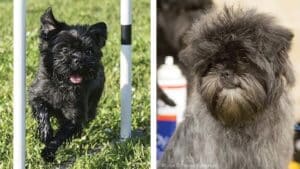
Explore the journey of Affenpinscher siblings, Jag and Sally. From agility victories to show ring prowess, witness their remarkable rise.

Sheila Wymore is the breeder behind Coachlight Affenpinschers. Read about the kennel’s beginnings, the sires, the dams, the puppies & more!
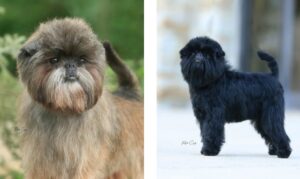
Explore the colors and tail types of Affenpinscher dogs. From rusty blacks to orangey tans, all colors are equally acceptable.
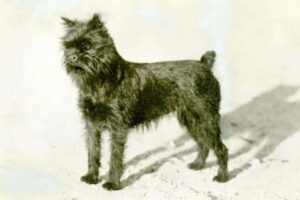
Monkey Dogs In America – Originally from Germany, Affenpinschers are a sturdy, comical Toy Breed historically believed to have been used in
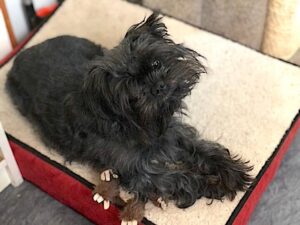
Life with Affenpinscher | Busby : I brought home my first dog when I was sixty. I had fallen in love with Bouviers, and got a baby male.
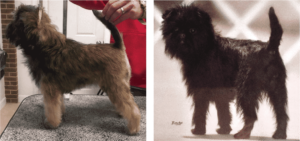
Preserving Affenpinscher Breed Type – Time? Yes, it’s time to step back and take a good, long, hard look at the Affenpinschers.
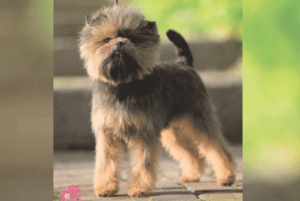
Learning how to judge Affenpinscher can be difficult for several reasons. As a rare breed, with no dogs exhibited in many areas of the US

Discover the essentials of the Affenpinscher breed and the importance of maintaining true breed type against the trend toward exaggeration.

Explore the journey of Affenpinscher siblings, Jag and Sally. From agility victories to show ring prowess, witness their remarkable rise.

Sheila Wymore is the breeder behind Coachlight Affenpinschers. Read about the kennel’s beginnings, the sires, the dams, the puppies & more!

Explore the colors and tail types of Affenpinscher dogs. From rusty blacks to orangey tans, all colors are equally acceptable.

Monkey Dogs In America – Originally from Germany, Affenpinschers are a sturdy, comical Toy Breed historically believed to have been used in

Life with Affenpinscher | Busby : I brought home my first dog when I was sixty. I had fallen in love with Bouviers, and got a baby male.

Preserving Affenpinscher Breed Type – Time? Yes, it’s time to step back and take a good, long, hard look at the Affenpinschers.

Learning how to judge Affenpinscher can be difficult for several reasons. As a rare breed, with no dogs exhibited in many areas of the US
The best way to ensure a long and happy relationship with a purebred dog is to purchase one from a responsible breeder. Not sure where to begin?
Contact the National Parent Club’s Breeder Referral Program, which is listed on the AKC Breeder Referral Contacts page.
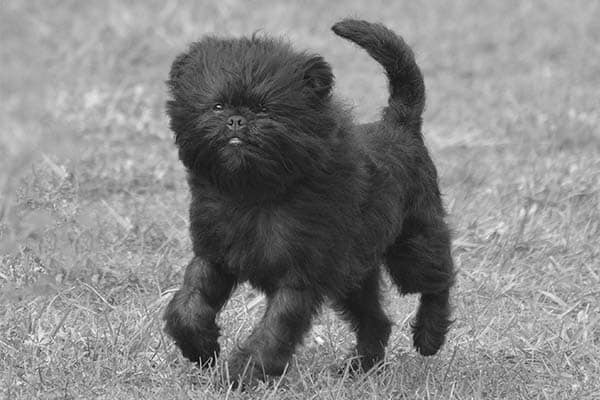

"*" indicates required fields
Showsight Magazine–the world’s most influential purebred dog publication since 1992. Each issue reaches a global audience dedicated to preserving the history and health of purpose bred dogs. Filled with award-winning editorial focused on news and insights from the dog show community, top breeders, handlers, AKC Judges, and more!